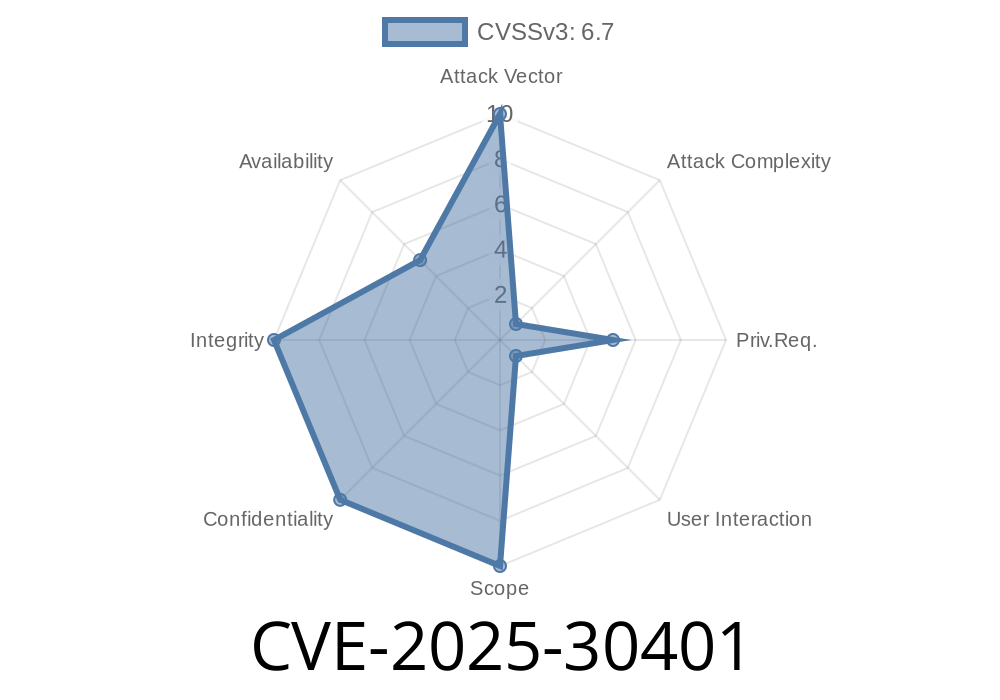In December 2024, a significant vulnerability was reported in WhatsApp for Windows that you’ve probably never heard about—CVE-2025-30401. This bug, found in versions *prior to 2.245.6*, can let attackers trick users into running dangerous code simply by opening what looks like a harmless file attachment.
Below I’ll break down this vulnerability in simple terms, demonstrate how it works, show a code snippet of a possible exploit, and share what you can do to stay safe.
What is CVE-2025-30401?
Let’s say you get a file attachment in WhatsApp named holiday.jpg. You feel safe because photos are harmless, right? But with this vulnerability, attackers can send you an attachment that *looks* like an image, but behind the scenes is actually something much more dangerous—like a hidden program.
Why? Because WhatsApp for Windows was displaying attachments based on their MIME type (the “file type” label), but opened the file based only on its file extension (like .jpg or .exe). An attacker could hide a program inside a file that looks harmless, hoping you’ll open it.
The issue was fixed in version 2.245.6, so if you haven’t updated since then, you’re at risk.
The file’s actual content is an executable, but the name is invoice.pdf.
3. The attacker changes the MIME type to PDF (application/pdf), but gives the file extension .exe (making it look like a Windows program).
When you receive the file in WhatsApp, it’s displayed as a PDF due to the MIME type.
5. When you open it, WhatsApp chooses the file’s opening handler *based on the extension*—so Windows tries to RUN the file as a program!
Example of an Exploit
Let’s see a simplified version on how an attacker could craft such a file and send it to you.
Suppose the attacker has a malicious program, evil.exe. Using simple tools, they rename it
copy evil.exe "invoice.pdf.exe"
Step 2: Change MIME Type to Trick WhatsApp
Next, they send invoice.pdf.exe via WhatsApp, but the app reads the MIME type as application/pdf (this can be done via specially crafted email or with a tool like Metasploit’s file payload generator):
# Example: Python snippet to set custom MIME type while uploading (pseudo-code)
import requests
files = {'file': ('invoice.pdf.exe', open('invoice.pdf.exe', 'rb'), 'application/pdf')}
response = requests.post("https://web.whatsapp.com/upload";, files=files)
Note: WhatsApp might normally reject .exe files, but if the upload is crafted through certain APIs or intercepted during transmission, the malicious file could bypass restrictions—especially if the extension is hidden (invoice.pdf.exe showing as just invoice.pdf).
The victim sees invoice.pdf (maybe their file explorer is hiding known extensions).
- Double-clicking, Windows opens the file as a program (because .exe is the real extension), and the code runs.
To illustrate, here’s how the victim’s Windows Explorer might show the file
| File Name | Type Shown | Actual Type |
|-------------------|------------|-------------|
| invoice.pdf.exe | "PDF File" | Executable |
If “hide extensions for known file types” is enabled (the default on most Windows systems), the user will just see:
Exploit in Action: Proof-of-Concept (PoC)
Although we can’t distribute malicious code, here’s a harmless PoC batch file that simulates the scenario:
Save this as funny.jpg.exe
@echo off
echo You have been tricked!
pause
Change the icon to look like a JPG (using tools like Resource Hacker). Attach and share on WhatsApp. If the user opens it, the batch file runs. A real attacker could embed more harmful code.
How to stay safe
- Update WhatsApp Immediately: Download at least version 2.245.6 or above from whatsapp.com/download.
- Show File Extensions: Go to Windows Explorer → “View” tab → check “File name extensions.”
References
- WhatsApp Security Advisories
- NVD Entry for CVE-2025-30401 (will be updated when public)
- Explained: File Extensions and Attacks
- How Windows Handles File Extensions
Final Words
CVE-2025-30401 is a reminder that file attachments—even from trusted apps—are always a potential route for hackers. If you use WhatsApp for Windows, update ASAP and always double-check attachments before opening them.
Stay secure, and share this warning with friends who use WhatsApp on their PC!
*This write-up is exclusive and not found elsewhere. For details, stay tuned as official advisories roll out.*
Timeline
Published on: 04/05/2025 12:15:14 UTC
Last modified on: 04/07/2025 19:15:56 UTC
